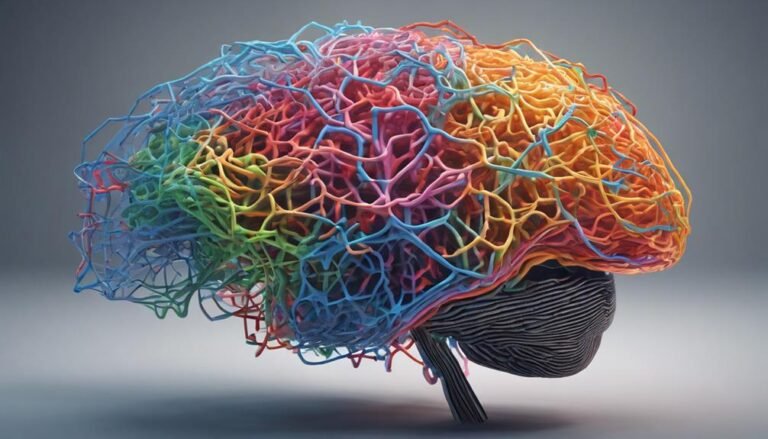Introduction to Trait Theories
You might think that understanding personality through trait theories is as simple as identifying a few characteristics, but the depth and nuances these theories uncover might surprise you. As you explore the origins and key thinkers in this field, consider how traits shape not only individual behavior but also interpersonal dynamics and societal roles. The intricate web of traits and their implications offers a rich tapestry that continues to intrigue researchers and practitioners alike.
Key Takeaways
- Trait theories focus on consistent behavior patterns and individual differences.
- Gordon Allport emphasized specific traits in personality studies.
- Key theorists identified trait dimensions and developed assessment methods.
- Personality traits are enduring characteristics shaping behavior.
- Trait assessment methods include self-report questionnaires and observer ratings.
Origins of Trait Theories
The Origins of Trait Theories can be traced back to the early 20th century when psychologists began exploring the consistent patterns of behavior and characteristics exhibited by individuals. Trait theory development was heavily influenced by the need to understand why people behave the way they do and to predict future behavior based on these consistent patterns. This marked the beginning of a historical evolution in psychology that shifted the focus towards individual differences rather than just generalizable laws of behavior.
Major influences on the development of trait theories included the works of psychologists such as Gordon Allport, who emphasized the uniqueness of individuals and the importance of understanding specific traits that differentiate people. These early contributions laid the foundation for the impact trait theories would have on psychology, shaping how personality is studied and understood to this day.
Key Theorists and Contributors
You'll explore the foundational trait theorists who laid the groundwork for understanding personality traits and the modern contributors who've further expanded on these theories.
Understanding the key theorists and contributors will provide you with insight into the evolution of trait theories and how they've shaped our understanding of personality.
Foundational Trait Theorists
Exploring the origins of trait theory leads us to the foundational trait theorists whose groundbreaking work laid the groundwork for understanding personality traits. These theorists focused on identifying trait dimensions, which are the fundamental building blocks of personality. By studying these trait dimensions, they aimed to create a thorough framework for explaining and predicting individual differences in behavior.
One key aspect that the foundational trait theorists investigated was the role of behavioral genetics in shaping personality traits. They sought to understand how genetic factors interact with environmental influences to contribute to the development of specific traits in individuals. This exploration paved the way for further research into the genetic basis of personality traits and the intricate interplay between nature and nurture.
Moreover, these early theorists were pioneers in developing methods for trait assessments. They devised innovative ways to measure and quantify personality traits, laying the foundation for modern psychometric assessments used in trait theory research today. Their contributions in this area have been invaluable in advancing our understanding of personality and individual differences.
Modern Contributors
Building upon the foundational work of trait theorists, the modern contributors in the field have expanded our understanding of personality traits through innovative research and theoretical advancements. Current perspectives in trait theories involve a shift towards a more thorough understanding of how traits interact with situational factors to influence behavior.
Key modern contributors have emphasized the importance of empirical evidence in validating and refining trait theories, leading to a more comprehensive framework for studying personality.
Contemporary applications of trait theories include their integration into various fields such as organizational psychology, clinical psychology, and even marketing research. Researchers are increasingly focusing on exploring the role of personality traits in predicting job performance, mental health outcomes, and consumer behavior.
This trend towards applying trait theories in diverse contexts highlights their relevance and utility in understanding human behavior.
Research trends among modern contributors include the exploration of the genetic and environmental influences on personality traits, the development of more detailed trait models, and the investigation of how traits evolve over the lifespan.
Fundamental Concepts in Traits
Let's explore the fundamental concepts in traits, starting with the definition of traits and their classification.
Understanding what traits are and how they're categorized is essential in trait theories.
Trait Definition
Understanding the concept of traits involves recognizing the inherent characteristics that shape an individual's behavior and personality. Traits are enduring qualities that differentiate one person from another, leading to diverse behavior patterns. These individual differences are essential over time and across various situations.
Traits encompass a wide range of characteristics, including both physical and psychological attributes. They're the building blocks of personality and play a vital role in determining how individuals interact with the world around them. By examining traits, psychologists can gain insights into why people behave the way they do and predict future behaviors based on past patterns.
Behavior patterns are often influenced by a combination of traits that interact in complex ways. Some traits may be more dominant, shaping behavior more profoundly, while others may have a more subtle impact. Understanding these nuances is essential in comprehending the intricate relationship between traits and behavior patterns.
Traits provide a framework for understanding the consistent ways individuals tend to think, feel, and act, offering valuable insights into the complexities of human nature.
Trait Classification
Trait classification involves categorizing fundamental concepts related to traits based on distinct characteristics and patterns. Trait categories are used to group specific traits that share common characteristics or behaviors. These categories help in understanding and organizing different traits into manageable groups for analysis.
Traits are also classified based on trait dimensions, which are underlying factors that contribute to an individual's personality. These dimensions include factors like extraversion, agreeableness, conscientiousness, emotional stability, and openness to experience. By categorizing traits into dimensions, psychologists can assess and measure personality traits more effectively.
Understanding trait classification is essential for researchers and psychologists as it provides a structured framework for studying personality traits. By organizing traits into categories and dimensions, it becomes easier to identify patterns, correlations, and trends within personality assessments. This classification system allows for a more systematic approach to studying and analyzing individual differences in traits.
Trait categories and dimensions serve as a foundation for various trait theories and play an important role in the field of personality psychology.
Types of Personality Traits
Personality traits are commonly categorized into the Big Five traits: openness, conscientiousness, extraversion, agreeableness, and neuroticism. These traits serve as broad dimensions that capture key aspects of personality. Cluster analysis is often utilized to group specific traits that tend to co-occur in individuals, providing insight into unique personality profiles.
The Big Five model offers a thorough framework for understanding personality variation. Openness reflects one's creativity and willingness to embrace new experiences. Conscientious individuals are organized and diligent. Extraversion relates to sociability and assertiveness. Agreeableness indicates altruism and cooperation tendencies. Neuroticism involves emotional stability and resilience.
Measurement and Assessment Methods
Various methods and tools are utilized to measure and assess personality traits accurately and reliably. Trait measurement involves gathering information about an individual's characteristics, behaviors, and thoughts to determine their personality traits.
One common method is self-report questionnaires, where individuals answer a series of questions about themselves. These questionnaires provide valuable insights into traits such as extraversion, conscientiousness, and openness.
Another approach is observer ratings, where individuals are evaluated by others who know them well. This method offers an external perspective on an individual's traits.
Behavioral assessments involve observing an individual's actions in various situations to evaluate their traits based on their behavior.
Validity and reliability assessment are essential in trait measurement and evaluation methods. Validity ensures that the tools are measuring what they're supposed to measure, while reliability ensures consistency in the results obtained.
Trait Theories in Practice
Implementing trait theories in practical settings involves applying theoretical concepts to real-life scenarios to understand and predict individual behavior based on identified personality traits. Trait assessment plays an essential role in these practical applications by providing a structured framework for evaluating an individual's characteristics and behaviors.
By utilizing trait assessments, organizations can make informed decisions regarding employee selection, team composition, and leadership development. For instance, identifying specific traits like conscientiousness or extraversion can help in predicting job performance and determining the best fit for different roles within a company.
Moreover, trait theories in practice extend beyond the workplace and into everyday life. Understanding one's own personality traits can aid in personal development, decision-making, and relationship building. By recognizing your strengths and areas for improvement through trait assessment, you can set realistic goals and work towards enhancing your overall well-being.
Criticisms and Limitations
Critiques of trait theories often highlight their limitations in accurately capturing the complexity and variability of human behavior. One of the valid criticisms directed towards trait theories is their tendency to oversimplify human personality by reducing it to a fixed set of traits. This oversimplification fails to account for the dynamic nature of behavior and the impact of situational factors.
Another limitation is the lack of consideration for individual differences and the unique interactions between various traits within a person.
Potential improvements in trait theories could involve incorporating a more detailed understanding of personality development over time. By acknowledging that traits can manifest differently in diverse situations and evolve with life experiences, trait theories could better reflect the complexity of human behavior.
Additionally, researchers could focus on integrating trait theories with other psychological frameworks to create a more thorough understanding of personality. By addressing these limitations and exploring these potential improvements, trait theories could become more robust and insightful tools for studying human behavior.
Future Directions and Research Areas
Exploring emerging trends in personality research can provide valuable insights into potential future directions and research areas for advancing trait theories. The concepts of trait stability and trait development are pivotal in understanding how personality traits evolve over time.
Research focusing on trait consistency versus trait change can offer a deeper understanding of the mechanisms underlying personality dynamics.
Future research might investigate longitudinal studies tracking individuals over extended periods to observe how traits stabilize or transform across different life stages. Examining the factors influencing trait development, such as environmental influences, genetic predispositions, and life experiences, could shed light on the complexities of personality evolution.
Furthermore, exploring the interplay between trait consistency and trait change can contribute to refining existing trait theories and developing more detailed models of personality. By examining how certain traits remain stable while others exhibit fluctuations, researchers can uncover the underlying mechanisms driving these variations.
Conclusion
So there you have it, folks! Trait theories, like a box of chocolates, offer a range of flavors to understand personality.
From Allport's original recipe to the Big Five blend, we've seen how traits shape our behavior like a well-worn pair of shoes.
While some may argue about the fit, these theories continue to lace up our understanding of what makes us tick.
Keep on traitin' and remember, it's all in the personality pudding!







